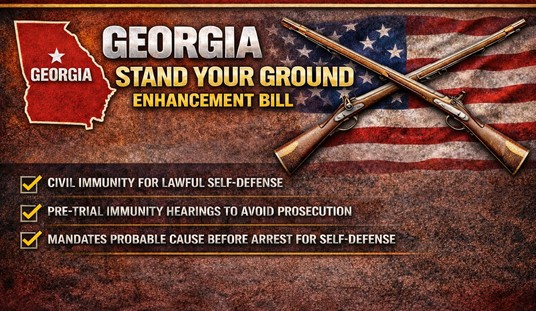Tennessee Gov. Bill Lee officially announced on Wednesday that he’s bringing lawmakers back to Nashville for a special session on public safety later this month, but the slate of bills that he’s bringing to lawmakers is missing the one piece of legislation he’s been stumping for over the past few months; a “temporary mental health restraining order” that’s his version of a “red flag” law.
According to the Tennessean Lee’s proposing a number of measures for the special session kicking off on August 21st, and while his proclamation setting the parameters of the session allows for consideration of his idea, if a “red flag” bill is introduced it won’t be coming from his office.
Lee’s administrative package includes:
- Codifying his executive order dealing with the Tennessee Bureau of Investigation and background checks. The proposal requires reporting of accurate, complete and timely records from court clerks to the TBI within 72-hours and requires electronic submissions of dispositions and expungements to the TBI.
- A TennCare mental health coverage waiver to allow federal matching funds for Medicaid to cover mental health and substance abuse services;
- Budget initiatives prioritizing hiring and retaining mental health professionals in the state;
- Eliminating certain practice requirements for psychiatric nurse training to expand access to mental health treatment;
- Greenlighting DNA collection at the time of arrest for felony crimes;
- Directing TBI to report on the state of human trafficking in Tennessee;
- Eliminating taxes on firearm safes and other safe storage initiatives.
…
Republican lawmakers have been vocally opposed to Lee’s spring proposal for an extreme risk protection order. It’s unclear if Lee will attempt to bring a similar proposal later this month amid continued pushback among his party and firearm-rights groups that encourage Lee to call off the special session altogether.
Lee first pitched his proposal in April, just a few weeks after the Covenant shooting as a direct response to the tragedy, saying “Tennesseans deserve a vote” on the policy, which would allow the courts to remove firearms from those considered a danger to themselves or others.
The governor committed repeatedly throughout the summer to push forward with the proposal, despite very little public support from members of his own party. Only seven lawmakers had publicly shared support for the bill.
As recently as late July, Lee expressed hope that the bill would pass.
“You know, whenever you bring a piece of legislation, you certainly hope that it does,” Lee said. “But that’s up to the General Assembly.”
Gun owners aren’t out of the woods yet, but this is a very good sign that Lee’s version of a “red flag” law is going absolutely nowhere when lawmakers return to the capitol in a couple of weeks. If Lee believed he had the votes to pass his measure it most definitely would have been a part of his legislative wishlist, so its absence speaks volumes about the scope of the opposition he received from both lawmakers and constituents around the state.
Democrats, meanwhile, are blasting the scope of the special session since it looks like most of their anti-gun measures aren’t going to get a hearing.
House Minority Leader Karen Camper, D-Memphis, said she was disappointed with the exact scope of the special session. She said she was hoping for a “serious discussion about gun reform in Tennessee.”
“The number of firearms in our state is staggering and has been since we passed the open carry and guns in trunks laws. But simply focusing on safe storage alone does not truly solve the problems we face in this state and that our constituents were begging us to debate after the Covenant school shooting in Nashville and the Prive restaurant shooting in Memphis this past March,” she said.
“The dangers that our families and schoolchildren face today frighten me, as they do most Tennesseans.”
House Democratic Caucus Chair John Ray Clemmons, D-Nashville, said the governor “wilted in the face of the legislative supermajority.”
“The winners here are special interests and extremist legislators holding our state hostage,” he said in a statement. “The clear losers are Tennessee families and school children. The ire of Tennessee families who want and deserve substantive action and policies to better protect our children and neighborhoods from the looming threat of gun violence should be squarely aimed at the GOP supermajority and its leadership in both houses. They have utterly failed our families. Our children deserve better.”
Expect to hear a lot more of that once the special session gets underway, even if the Republican supermajority ends up taking substantial steps to improve access to mental health care and substance abuse treatment. Democrats were and are hoping to use the special session to go after guns and gun owners, and now that Lee has limited the scope of the session they’ll use those limitations to bash their colleagues for “inaction” no matter what actually ends up getting approved.
It was a political miscalculation for Lee to call for the special session in the first place, and the secrecy surrounding the specific legislation he was working on only added to the distrust and opposition from many conservative corners of the state. The governor’s decision to drop his version of a “red flag” law from his list of recommended legislation is the smartest political move he’s made in months, but he’s still given Democrats a high-profile platform to bash their colleagues across the aisle and promote the false idea that we can ban our way to safety by criminalizing our Second Amendment rights; a political misstep that could come back to bite him (and the GOP) in next year’s elections. Republicans can help squash that line of attack by offering up substantive improvements to the state’s mental health and criminal justice systems when they return to Nashville, but the special session is still an unforced error on the part of the governor.









Join the conversation as a VIP Member